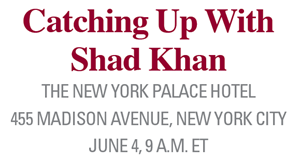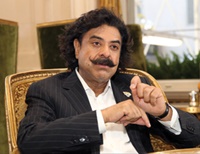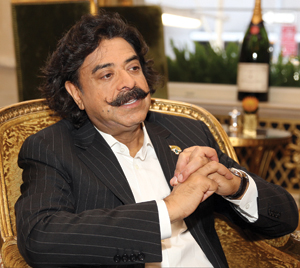 |
Photo by: PATRICK E. MCCARTHY (5)
|
Shad Khan walks into the lobby of The Palace Hotel on the corner of Madison and Fifth avenues on an early summer morning clutching a bag of batteries he just bought at a drugstore around the corner. Wearing a pinstripe suit and white shirt with an open collar, Khan is taller and leaner than I anticipated. He was in New York City for a couple of days and agreed to spend time over breakfast talking about his first year of ownership in the NFL. As we chat in the lobby, onlookers gather while Khan poses for photos by our photographer. “Did you see ‘The Great Gatsby’? The new one?” he asks me. “You need to go see it. This hotel was prominent in it. This used to be the social hub in the ’20s.
This is an iconic place.” We then grab a corner table in the dining room, and while I didn’t know it at the time, after breakfast, he met with executives from Fulham FC, which eventually led to his purchase of the EPL team in London in July.
Over a frittata and coffee, the gracious Khan talked about coming over to the U.S. from Pakistan at the age of 16, building his auto parts company Flex-N-Gate, and life lessons — most of which can be read in The Sit-Down. But he also shared what he learned in his first year owning the Jaguars.
“The way I look at the Jaguars’ structure is two parts: business and football. Business I understand. But when I got there, we were buying tickets to fill the stadium, our sponsorships were headed south, ticket prices hadn’t been adjusted. And if you asked people, ‘Why can’t we sell tickets?’ you would hear, ‘We didn’t draft a certain player’ or ‘We haven’t won in a number of years,’ etc., etc. That would be like me saying, ‘How come I’m not selling this auto part? Well, I don’t have the lowest price; I don’t have the best quality. Right there tells you that something is wrong. You have to start change from the top.
“I’m not going to be running the team or be there every day. I wanted someone on the business side who could handle it all, and I found that in [longtime sports executive]
Mark Lamping. Every change was going to start with him. So that’s a very, very critical hire. Probably the most important hire. So I talked to a bunch of people, and Mark was the guy. He is going to set the example of what kind of people we want in the organization. Open. Transparent. Hardworking. Accountable. These are the values that we want. And then there was the football side. I really wanted to have two people reporting to me. Business side and football side.
“I did that for a number of reasons. One, they need to work together, but one can’t compromise the other. For example, you can’t have the business side saying, ‘I could be selling more tickets if we were winning.’ We aren’t selling victories; we are selling a great game-day experience. On the flip side, the football side needs to work with the business side, and they can’t be saying, ‘Look, we can’t sell tickets so we need to draft this guy.’ They need to be focused on long-term viability and success on the football field. The day-to-day money issues shouldn’t be involved.
“You have to have some kind of order. So I wanted general manager
Dave Caldwell and Mark reporting to me. We have the coach,
Gus Bradley, who is part of football operations. But, these three — Mark, Dave and Gus — have to like each other,
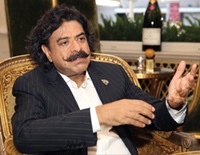 |
|
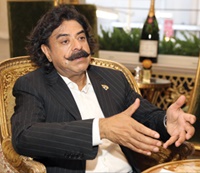 |
Owner Shad Khan is energized about the Jaguars’ new hires.
|
trust each other and be able to work together.”
Khan was clearly energized when talking about his new hires on the football side, feeling he now had key pieces to build on. He was very active in the search for a coach, and we talked a lot about the process.
“In looking for a coach, I was looking for two things,” he said. “Cultural fit and competency. Competency: Are they a good coach? Are they able to get the most out of the talent they have? Football has changed. Players have changed. They are smarter, they are harder working and they are richer. Would the style of the Vince Lombardis and other iconic coaches work today? My sense is probably not, for a lot of reasons. You have to have a coach who understands that, but can motivate the modern football player to put out the best. You can’t just go out and say, ‘Go and do it because I told you to.’ It’s a very, very tough job.”
As breakfast winds down, we spend a lot of time talking about takeaways from his 20 months in ownership. I figured it would have something to do with his newfound celebrity — magazine covers, a “60 Minutes” profile and just the overall attention he has received.
But what’s been the biggest surprise to him is the power of the NFL. “The biggest learning curve for me is how big football is,” he said. “It’s huge. Football is an iconic institution for a number of people, and the impact it has on the media is amazing. I’ve spent a lifetime in automotives, but only a year in football, and I can’t be hardly anywhere on Earth without people knowing who you are and having questions. You can be walking down the street and they just start talking to you and they’ll know about our draft. I had no clue about the size and the scope of football. The amount of scrutiny, this insatiable need, the amount of curiosity, I had no idea. I was not prepared for it. But you have to come around the curve quickly.”
Abraham D. Madkour can be reached at amadkour@sportsbusinessjournal.com.



